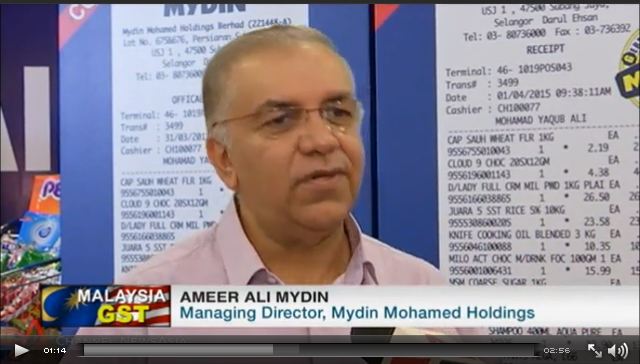KUALA LUMPUR: “I want to tell you that Apr 1 is no April’s Fool Day; GST will be implemented definitely,” said Malaysian Deputy Finance Minister Ahmad Maslan. True to his word, the Goods and Service Tax (GST) in Malaysia came into effect.
Under the new GST, consumers will be charged a flat rate of 6 per cent, replacing the sales and services tax that ranged from 5 per cent to 10 per cent.
About 306,000 businesses have registered for the new GST so far. The government said that those who failed to do so will immediately be fined for non-compliance. The deadline to register had been extended twice in the past.
Registered or not, it has been a difficult undertaking for companies big and small. Many large corporations could afford to bring in consultants and purchase new GST-enabled software, but they say the long and ever-changing list of exemptions is confounding. More than 120 items including basic foodstuff have been exempted so far, with negotiations reportedly still going on behind the scenes.
UNCERTAINTY A BANE FOR BUSINESSES
Said Managing Director of Mydin Mohamed Holdings Ameer Ali Mydin: “It’s a complex mechanism where you have exemptions on a lot of things. Suddenly, two days ago, books were exempted again – all reading materials – so we had to re-code all again. There is a heavy cost for this which we have to bear.”
Mr Ameer said it would be easier if the government did not constantly change their policies and “maintain” what they said. “I am all for certainty. In business all we want is certainty,” he said.
Neighbourhood sundry shops are hurting too. Many find it difficult to understand the new tax system, let alone how to comply with it.
“We have updated the machine with the software but even today we are counting manually,” said grocery and eatery proprietor Tanuiah. “They need to educate us more.”
While sundry shop owner Tanga Rajah said: “I need to pay for rent, electricity, salary and petrol. If I don’t make a profit I will go bankrupt”.
Many are worried their business may suffer because of higher prices as all GST-related expenses are coming out of their pockets. There is also great uncertainty on how efficient customs will be in returning the rebate.
Economists say all this uncertainty may be enough to keep foreign brands at bay. Said economist for opposition party Parti Keadilan Rakyat (PKR) Wong Chen: “This is a tricky time to come in because the rules are not clear, and the efficiency of implementation is not clear. It would be ideal for them to sit back for six months, see how the roll-out is, and to see the impact on consumer market.”
Many also expect consumer spending to nosedive in the first six months post-GST, during a period of adjustment.
However, the country’s stock market operator Bursa Malaysia said it expects minimal impact on trading, due to the fact that GST will only be levied on transactional fees, and not on the securities themselves.
– CNA/ek
Source: http://www.channelnewsasia.com/news/asiapacific/teething-pains-as-new/1760724.html










